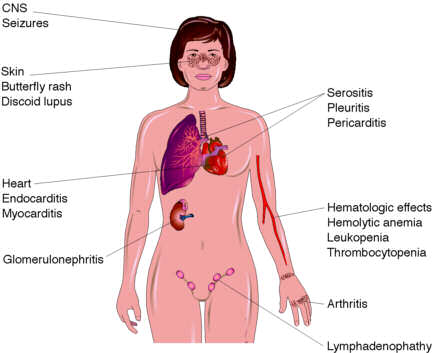Systemic Lupus Erythematosus (SLE)
From Wikiwel
(Redirected from Lupus)
Systemic lupus erythematosus (SLE) is an autoimmune disease. In this disease, the body's immune system mistakenly attacks healthy tissue. It can affect the skin, joints, kidneys, brain, and other organs.
Symptoms
SLE is the most common form of lupus and can affect different organs and areas, including your veins, lungs or digestive system. It can also cause kidney damage. You may suffer multiple symptoms, such as fatigue, sensitivity to sunlight, pulmonary hypertension, joint pain, and rashes.

Causes
- The cause of autoimmune diseases is not fully known.
- SLE is more common in women than men.
- It may occur at any age. However, it appears most often in people between the ages of 15 and 44.
- The disease affects African Americans and Asians more often than people from other races.
- Certain drugs may also cause SLE.
Home remedies
- Alfalfa shows promise in healing lupus and other auto-immune diseases.
- Fritillaria has been found to be very effective in treating lupus.
- Immune support : probiotics to help support proper immune function. Look for multi-strain products that contain a wide variety of strains including both the Bifidobacterium and Lactobacillus species. Of special importance is Lactobacillus rhamnosus because it helps to strengthen gut-barrier function and has been shown to have a beneficial impact on autoimmune conditions.
- Have a healthy diet rich in fresh fruits and vegetables.
- Coconut oil has been shown to help support healthy skin, and skin is an area commonly affected by lupus.
- Licorice can be used for auto-immune conditions including lupus, scleroderma, Rheumatoid Arthritis (RA) and animal dander allergies.
- The calcium from dark green leafy vegetables can help, as well as nutrient-rich homemade broths (beef or chicken).
- Omega-3 fatty acids are important, as they are Nature’s anti-inflammatory and lupus is a very inflammatory condition. Eating wild Alaskan salmon and supplementing with a top-quality fish oil formula can ensure your body has enough of these crucial nutrients.
- Fish Oil is also beneficial to patients suffering from lupus, which is a disease characterized by the attacks of immune system of the body on various organs and tissues. It also helps in reducing associated fever, skin rashes and fatigue.
- Cetylated Fatty Acids are also used for diseases in which the body attacks itself (autoimmune diseases) including Sjogren's syndrome, systemic lupus erythematosus (SLE), and multiple sclerosis (MS).
- Proteolytic Enzymes : When your body is suffering from an inflammatory disease like rheumatoid arthritis, protease enzymes can help deconstruct immune complexes formed as a result of the condition, according to Murray. He notes that autoimmune diseases like lupus and rheumatoid arthritis produce high levels of these antibodies that can build up in your body, increasing redness, pain and swelling. Breaking down this antibody-related inflammation into its basic elements makes it easier to eliminate from your body and increase the amount of nutrient-carrying blood to the site
- Glucoamylase: Studies show that glucoamylase combined with other enzymes can also lower autoimmunity responses. In the case of autoimmune diseases, antigens and antibodies, when not cleared out over time, can create tissue damage in the body. This can lead to diseases such as rheumatoid arthritis, lupus and some types of kidney disease. Some research suggests that enzymes can influence the immune system in beneficial ways.
- Alpha Linolenic Acid (ALA) may help to treat autoimmune diseases such as lupus and rheumatoid arthritis.
- Thyme : The volatile essential oils in thyme are loaded with anti-rheumatic, anti-parasitic, anti-septic, anti-viral, and anti-fungal properties. If taken on a regular basis it can significantly help to reduce the viral load in the body which makes it very beneficial in dealing with Chronic Fatigue Syndrome, Fibromyalgia, Hashimoto’s Thyroiditis, Rheumatoid Arthritis, Lupus, Vertigo, Tinnitus, and Multiple Sclerosis
- Zhu Ye Shi Gao Tang
- Use Colloidal Silver internally and topically on the skin due to its antibacterial, antiviral and immune supporting properties.
- CranioSacral Therapy
- AVOID :
- Refined carbs, sugars, and soda
- Processed foods and fast food
- Unhealthy fats (hydrogenated oils, margarine, processed vegetable oils)
- Caffeine
- Alcohol
Warnings
- Some people with SLE have abnormal deposits in the kidney cells. This leads to a condition called lupus nephritis. People with this problem may develop kidney failure. They may need dialysis or a kidney transplant.
- SLE can cause damage in many different parts of the body, including:
- Blood clots in arteries of veins of the legs, lungs, brain, or intestines
- Destruction of red blood cells or anemia of chronic disease
- Fluid around the heart (pericarditis), or inflammation of the heart (myocarditis or endocarditis)
- Fluid around the lungs and damage to lung tissue
- Pregnancy problems, including miscarriage
- Stroke
- Severely low blood platelet count (platelets are needed to stop any bleeding)
- Inflammation of the blood vessels
- Both SLE and some of the medicines used for SLE can harm an unborn child. Talk to your provider before you become pregnant. If you become pregnant, find a provider who is experienced with lupus and pregnancy.
References
Medical Disclaimer
This information is not meant to be substituted for medical advice. Always consult a medical professional regarding any medical problems and before undertaking any treatment or dietary changes.